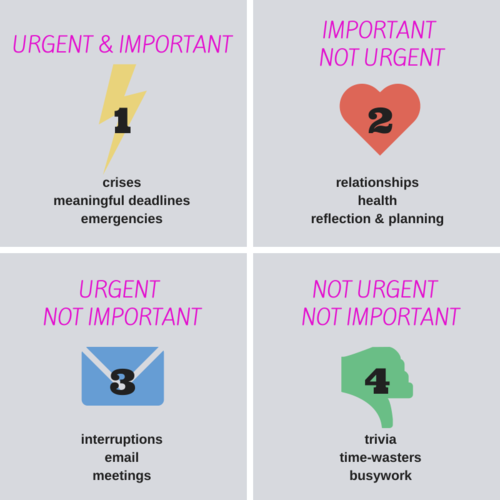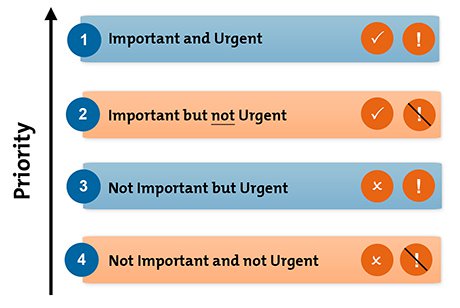
Planning
Research
shows that for every 1 minute you spend in
planning, you will gain 10 in execution. 1
minute = 10 minutes. 10 minutes = 1 hour and
40 minutes!
This may
seem amazing because you may feel like you
are already doing all you can each day!
If you
could just gain an extra half-hour a day
through effective time management, you would
have 22 more days available to you per
year.
You have to take time to make time to
"sharpen the ax."
Planning is
the difference between being REACTIVE and
PROACTIVE. When you donít plan, you end up
responding to the dayís events as they
occur.
What are you
planning for?? What are you trying to
achieve??
Do you have
GOALS?
Lifetime -
10 year - 5 year - 1 year - 1 semester - 1
month - 1 week - 1 day
What is
important to you?
Important:
activities have an outcomes that leads to us
achieving our goals (long-term consequences)
Urgent: Activities
that demand immediate attention, and are
usually associated with achieving someone
else's goals (short-term consequences)

Which
quadrant makes you BUSY?


 |
Set priorities: if you
are spending too much time on low
priority items, rethink; don't always do
the most recent but least important
thing |
 |
Learn to use small
chunks of time. Don't wait for the
several hour block which may never come |
 |
Mark down everything,
including assignments, dates, work,
concerts, events, pub crawls |
 |
Utilize "the night
before" to be prepared (correct books in
backpack, files in Dropbox instead of on
desktop); use "remember" sticky notes,
put list on to-do, alarm in phone |
 |
Pencil in due dates when
you should begin working on it ("paper
due in one week") |
 |
Begin assignments
immediately |
 |
Include daily schedule
of classes, work, events but also
deadlines |
 |
Strategies against
procrastination. If you have an hour,
maybe you can't write a paper, but you
can proofread the part you have or read
part of a chapter |
 |
Use wasted time:
waiting for a class, in a doctor's
office: listen to taped lectures, read,
study flash cards for things that must
be memorized |
 |
Even waiting in a
grocery line, you could be reviewing
what you are memorizing |
 |
Divide your time into
large categories. It is not all about
school, but socializing should not be
emphasized at the expense of school;
balance the activities in your life |
 |
Look at your calendar
EVERY morning |
 |
Tackle major projects in
sections; do not wait until it is too
late to do your best job |
 |
Break down the material
in major exams |
 |
Get enough sleep.
Schedule when to stop and get rest.
This will help you remain relaxed and
alert. Those who become overwhelmed are
those that give up. |
 |
Remove distractions. An
hour at the library is worth two with
distractions. |
 |
Schedule classes close
together to avoid the temptation to skip
class or go out in between and not make
it back in time; the earlier the class,
the better prepared you will be as far
as brain power to be attentive. |
 |
Cramming does not stick
|
 |
Set your own deadlines
for chunks of work (not just for the
final project/paper) |
 |
Don't let email/Facebook,
etc. distract you from an hour |
 |
Say "No" when you should |